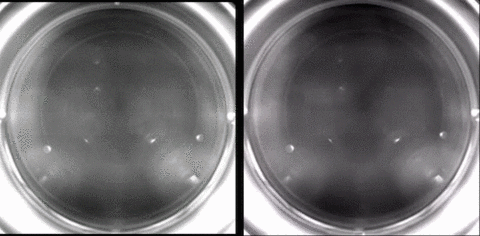Curi Bio, a leading developer of human stem cell-based platforms and technologies for drug discovery, today announced the exclusive commercial acquisition from StemBioSys of the CarTox™ technology platform for calcium and voltage optical mapping. In parallel, Curi Bio announced it will commercialize the technology through its newly announced product: the Nautilus™ optical mapping system. By providing drug developers with human-relevant tissue-specific biosystems in the preclinical stage of drug development, Curi helps pharmaceutical partners develop safer, more effective therapeutics.
This press release features multimedia. View the full release here: https://www.businesswire.com/news/home/20220329005440/en/

Baseline-Human Atrial hiPSC-CMs (left) and +E-4031-Human Atrial hiPSC-CMs (right) (Graphic: Business Wire)
With the Nautilus system, scientists can achieve clinically-relevant electrophysiology and calcium transient measurements in vitro in a high-throughput, reproducible screening format. Curi will make the Nautilus system available to pharmaceutical and research customers as a standalone bioscience instrument, compatible with Curi Bio’s market-leading cloud-based data analytics platforms. Curi will also offer service contracts and partnerships leveraging the system for applications in drug discovery, disease modeling, and safety and efficacy screening. Through this acquisition, Curi continues to grow its suite of market-leading platforms, including Mantarray (3D engineered muscle tissue platform for contractility analysis), Pulse (high-throughput video analysis of contractility), and NanoSurface Plates (structural maturation of 2D cardiac and skeletal muscle cultures).
Human iPSC-derived cardiac and skeletal muscle models hold great promise for disease modeling as well as safety and efficacy screening of drugs in the preclinical stage of development. However, traditional calcium and voltage optical mapping solutions are often laborious, limited, and may not be amenable to studying more complex (3D) tissues. The Nautilus system enables researchers the ability to condense days of data acquisition and analysis to minutes via an automated workflow. With the ability to quantify action potential duration, calcium transients, triangulation, and other key electrophysiological metrics, the platform allows users to collect comprehensive 2D and 3D data sets for their drug discovery and screening, all in standard SBS-compliant plate formats.
Key applications include accurate detection of positive inotropic and chronotropic response, conduction arrhythmias, as well as prolongation of action potentials. The Nautilus system was also featured in a Nature Scientific Reports publication entitled, "Human perinatal stem cell derived extracellular matrix enables rapid maturation of hiPSC-CM structural and functional phenotypes” by Block et al. The platform enabled high throughput cardiotoxicity screening of human cardiomyocytes utilizing reference compounds recommended for the evolving Comprehensive In Vitro Proarrhythmia Assay (CiPA) coordinated by the Health and Environmental Sciences Institute (HESI). The paper was published as a collaboration between the lab of Dr. Todd Herron, Director of the Frankel Cardiovascular Regeneration Core Laboratory at the University of Michigan, and StemBioSys, which was awarded a Phase II SBIR grant from the NIH.
“With Curi’s depth of product development, manufacturing, marketing, and customer support capabilities in highly engineered laboratory instrumentation, we know that the Nautilus instrument will be successful in the market,” said StemBioSys President and CEO, Bob Hutchens. “Partnering with Curi Bio on this enables StemBioSys to focus on our core competencies of providing world class cells and cell expansion products to the global marketplace. We look forward to working with the Curi team on this important project, as well as continuing to identify new areas where StemBioSys and Curi Bio can work together for the benefit of both companies.”
“At Curi Bio, our goal is to provide researchers with innovative human-relevant cells, systems, and data to accelerate the discovery of new medicines,” said Curi Bio CEO, Michael Cho. “By partnering with StemBioSys and adding the Nautilus system to our suite of products, drug developers can now access key electrophysiology and calcium metrics faster and at the scale necessary for their drug discovery and preclinical screening workflows.”
Dr. Nicholas Geisse, Chief Science Officer of Curi Bio, will present on the Nautilus and Mantarray systems in a presentation at the Society of Toxicology’s 2022 Annual Meeting. Additionally, Curi Bio team members will be available at Booth #1828.
Event: Society of Toxicology 2022
Date: Tuesday, March 29, 2022 at 10:30 am PDT
Session Title: High-throughput Assessment of Cardiac Safety via Contractility Measurements of 3D Engineered Heart Tissues
To learn more about how the Nautilus system can improve the predictive power of your experiments, or about Curi’s other human-relevant preclinical platform technologies and services, please reach out at www.curibio.com/contact.
About Curi Bio
Curi Bio’s preclinical discovery platform combines human stem cells, systems, and data to accelerate the discovery of new medicines. The Curi Engine is a comprehensive, bioengineered platform that integrates human iPSC-derived cell models, tissue-specific biosystems, and AI/ML-enabled phenotypic screening data. Curi’s suite of human stem cell-based products and services enable scientists to build more mature and predictive human iPSC-derived tissues—with a focus on cardiac, musculoskeletal, and neuromuscular models—for the discovery, safety testing, and efficacy testing of new drugs in development. By offering drug developers an integrated preclinical platform comprising highly predictive human stem cell models to generate clinically-relevant data, Curi is closing the gap between preclinical data and human results, accelerating the discovery and development of safer, more effective medicines.
For more information, please visit www.curibio.com.
About StemBioSys, Inc.
StemBioSys, Inc. is a privately-held biomedical company. Our technologies represent the next evolution in cell research and are branded to the research market under the CELLvo™ label. The centerpiece of these technologies is our CELLvo™ Matrix. This cell derived microenvironment allows a variety of cells to replicate (multiply in number) more rapidly and express markers indicative of potency beyond that seen with traditional tissue culture substrates. The company also has several cell products isolated and expanded on our matrix. StemBioSys has also developed a novel approach for preclinical cardiac safety testing, which is currently being used by several commercial partners. Details of this approach were described in Nature Scientific Reports in November 2020.
For more information, please visit www.stembiosys.com.
View source version on businesswire.com: https://www.businesswire.com/news/home/20220329005440/en/
Contacts
Heejoon Choi
Director of Sales & Marketing, Curi Bio
heejoon@curibio.com














